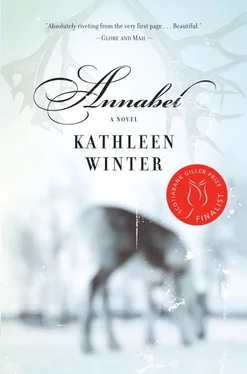“If you don’t have a goal” — their backs touched the wall, which was hot though there were patches of snow — “you might as well blindfold yourself and see where you end up.”
Wally Michelin’s father spent his trucker’s wages on building supplies every chance he got, and he had covered the walls with terracotta stucco no one else in Croydon Harbour had. It retained heat like clay. Treadway had not approved.
“That’s going to crumble inside five winters,” he’d said, as Gerald Michelin and his visiting brothers-in-law had applied the mud with graceful trowels. But it had not crumbled, and Wayne had heard Jacinta tell Eliza Goudie she envied the way Ann Michelin’s pots of geraniums splashed red against it like an Italian villa.
“I’ve got a goal.” Wally gave Wayne a stack of Oreos. The Michelins ate brand-name groceries. Wayne was used to food procured from raw materials.
“What?”
“To sing in German.”
“Like Lydia Coombs?”
“I wrote her a letter and guess what. Lydia Coombs wrote me back. And she sent me a present. An important present. Want to see it?”
Lydia Coombs had come to Croydon Harbour Elementary on a national tour of outpost schools, to show children the life and work of a real opera singer. Lydia Coombs had told them that, when she was ten years old in her town on the north shore of the St. Lawrence River in Quebec, one of the nuns, Sister Angelica, had told the class to run away. She had told them that if she, Sister Angelica, had run away in time, she could have gone to Vienna and made a life there for herself as a professional contralto. She told the class this in secret. Run away, before it’s too late. When the mother superior was outdoors milking the school’s cow every morning at eleven, too far away to hear, Sister Angelica had sung Schubert for the children. “It became normal for us to hear Schubert,” Lydia Coombs said, “and nothing in my whole life has ever been as beautiful as that voice, and I promised myself I would run away and learn to sing like that.” Then Lydia Coombs had sung something for Wayne and Wally’s class.
“What was that German thing she sang?” Wayne asked now.
“It wasn’t German,” Wally said. “It was a French poem by Jean Racine, and Gabriel Fauré composed the music.”
Wayne could not imagine anyone else in his class remembering this. After Lydia Coombs had sung for them the recess bell had rung. Donna Palliser had leaned against the wall licking syrup out of her Cherry Blossom until she held an empty cup of chocolate with the bare cherry in it. She nibbled the walls of the cup and popped the cherry on its chocolate disc into her mouth while the other girls repaired hopscotch lines and Bruce McLean and Mark Thevenet scuffed the ground looking for Export A butts with enough tobacco in them to light. Lydia Coombs might as well have spoken to them about dentistry or responsible government.
“You copied her address off the board.”
“Yeah.”
“What did your letter say?”
“That I’d like her to send me a copy of the poem by Racine. And she did. She sent this too.” Wally showed him an envelope of strange limp paper, unlike anything in the stationery section at the Hudson’s Bay store. In it was Lydia Coombs’s letter, written in black ink, and a creamy booklet.
“This is the sheet music of Fauré’s score.” Wally held it carefully. The notes, staff, title, and price in francs were marked in a lovely, mysterious script. There were music sheets in school, but they had been copied on an ancient Gestetner, and the notes were sparse on a bare ground of paper: one junco’s tracks on snow. These sheets were covered in grace notes, sixteenth notes, sharps, flats, and accidentals; not the tracks of one lonely bird but the song notes of that bird in a glorious meeting of its sisters, friends, and cousins.
“Wow.”
“I have to study it every night in bed. Some night a tiny part is going to make sense, and then that part will grow, and one day I’ll understand it all.”
Wally’s mother did not listen to music the way Wayne’s mother did. There was no musical instrument in Wally’s house. How would she learn the piece? How would she learn anything? Wayne felt dismayed. He had met no one who had such a goal, and felt disturbed by Wally’s confidence in something that seemed to him destined to die.
“I remember one part,” Wally said, and she hummed the notes. “If I study the notes really hard, I’m going to find it on the paper, and then I’ll know where I am.”
Through grade six, Wayne and Wally remained friends, and while Treadway wished Wayne would befriend a boy, he did not act. He hoped the friendship with Wally would end on its own. But when he watched Wayne and Wally meet in the mornings and walk to school, he did not like it.
“Dad.”
“What, son?” Treadway had asked Wayne to help him tidy old strings and cabbage leaves in the shed. Treadway hung his cabbages from their thick necks with the same nylon string he used to make his woodcutting snowshoes, which were more temporary and rougher than the trapping shoes he made of sinew. He grew between fifty and seventy-five cabbages each year, depending on the weather and the cabbage moth, and he hung these over the barrels of partridgeberries and blueberries, which froze, and which each had a cup lying on top for pies and jam. The outer leaves of the cabbages wrinkled and froze, and in spring you had to clear up old leaves that had fallen all over the floor.
“You know those logs over the creek?”
“Yes.”
“Can I have them?”
“What do you want those for?”
“I don’t want to take them. I want to put better wood over them. The wood that’s over them now is rotting.”
“That’s because I don’t bring firewood out of that part of the woods anymore. You can’t keep bringing wood from the same place or you’ll have no woods. I should have hauled up those logs last year.”
“But could you leave them there and could I have them? I want to make a place.”
“You want to make a fort over the creek.”
“I guess. Yeah.”
“A hideout.”
“Kind of.”
“We had hideouts. We used to spend the whole summer in them.”
“Did you?” Wayne liked it when his father remembered being young.
“Did we ever. We ate and slept in them. Me and Danny Fortescue and Jim Baikie and a gang of other lads. But why would you want to have your fort over the creek? You want a hideout in the woods, not out in the open.”
“I think it would be really great over the water.”
“I suppose a lot of forts did have approaches by water. You could see the enemy coming that way, by boat.”
Wayne had not been thinking of enemies. “Can I use that wood in the corner?”
“I was going to use that to repair the shed.” Treadway assessed the pile. “But I suppose you could have some of it. That creek is not very wide. But have you got a clue how you’re going to build a fort over it?”
Wayne had something in mind. He did not know if he could explain it to his father. “It has a cover. Like a roof. But spaces to look through.”
“I don’t mean the top,” Treadway said. “The top is airy-fairy. You can stick any kind of top on it. What I’m talking about is the foundation. How are you going to make the base? That’s what you have to think of first.”
“That’s why I asked you about the logs that are already there. Could we just put some boards over those?”
“That’s just a log skid. You’re only going over that once in a blue moon with a sled. The logs are slippery and half rotten. That’s no good for a fort. For a fort you want something that goes down into the creek bed.”
“Dad, I don’t need anything like that. I just need a small place.”
Читать дальше












